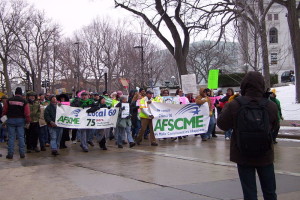PA unions coalesce against ‘paycheck protection’ legislation

By Andrew Staub | PA Independent
Unions across Pennsylvania are fighting a proposal that would end the practice of automatically deducting dues from public workers’ paychecks. The plan squelches the voice of organized labor, the labor groups say.
“This is as vindictive, just ‘get-the-union’ kind of a piece of legislation,” said David Fillman, executive director of the American Federation of State, County and Municipal Employees Council 13.
Two bills, one in the state House and one in the Senate, would prohibit unions from negotiating the paycheck deductions into collective bargaining agreements.
Lawmakers haven’t voted — both bills are still in committees – but the rhetoric over the proposal flared over the past week as lawmakers’ held closed-door discussions about the legislation.
LABOR BATTLE BREWING: Legislation that would end the automatic collection of dues for Pennsylavnia’s public-sector unions includes shades of the drama that played out in Wisconsin in 2011.
State Sen. John Eichelberger, R-Blair, the main sponsor of the bill in his chamber, said he has long been bothered about the government’s collection of union dues. His concern only grew, he said, after several elected officials were charged with corruption over allegations of using taxpayer resources for political purposes.
“I meet with a lot of union members that don’t agree with what’s happening with union dues money and PAC money, but they feel trapped in this system,” Eichelberger said. “That dues-collection process is really part of the entire entrapment. To them, they feel like this is a difficult thing for them to unravel.”
Fillman estimated the legislation would affect 95 percent of the 65,000 employees represented by AFSCME Council 13, the state’s largest public-sector union.
Union officials, such as Rick Bloomingdale, president of the Pennsylvania AFL-CIO, have countered that the payroll deductions are not forced, but rather part of bargaining processes that ultimately end with contracts approved by employers and unions.
Those who want to end that practice “want nothing more than to silence unions in both the legislative and political arenas,” Bloomingdale wrote in a letter urging House members to reject the legislation.
The Commonwealth Foundation, a free-market think tank, has been one of the most vocal advocates of the so-called paycheck protection legislation, arguing that organized labor is fighting to keep using public resources for political purposes.
“This practice is the same one that landed many legislators and their aides in prison. Yet we allow government unions to continue to do this under the Capitol dome and in school districts across Pennsylvania?” Commonwealth Foundation President and CEO Matthew Brouillette said in a statement.
But Fillman believes it’s a moot point to argue that union dues are used for political purposes.
Dues can be used for issues-related advocacy, but members voluntarily contribute toward union political activity, such as directly donating to a favored candidate, said Fillman, who believes singling out the deduction of unions could open the door for a constitutional challenge.
Public employees also have the right to forgo joining a union and have the option of providing a smaller “fair-share” contribution that funds the cost of representing all workers in a bargaining unit.
The dues debate includes shades of the much larger battle that played out between organized labor and Republican Wisconsin Gov. Scott Walker in 2011. Union membership has fallen sharply there after the state curbed the collective bargaining power of public-sector unions by requiring them to re-certify each year and prohibiting employers from collecting dues, among other limitations.
Eichelberger’s legislation — and a similar bill proposed by state Rep. Bryan Cutler, R-Lancaster — isn’t as sweeping, but it still has drawn the ire of public- and private-sector unions alike.
The Service Employees International Union and the International Brotherhood of Electrical Workers have also spoken out against the changes. A spokesman for the Pennsylvania State Education Association did not return messages seeking comment.
The legislation in the House would not apply to firefighters, police officers or prison guards, but Wisconsin’s situation serves as proof that other public-sector unions could feel the effects if the legislation passes.
“We will fight like heck to make sure that this doesn’t happen,” Fillman said.
Andrew Staub is a reporter for PA Independent and can be reached at Andrew@PAIndependent.com. Follow @PAIndependent on Twitter for more.
The post PA unions coalesce against ‘paycheck protection’ legislation appeared first on Watchdog.org.







